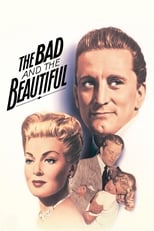tmdb28039023
Aug 30, 2022
5/10
The Bad and the Beautiful is sort of like Old Hollywood’s Rashomon. Three characters appear before a fourth to tell a story about a fifth; the three stories are different but interrelated, and the moral of each is the same: studio chief Jonathan Shields (Kirk Douglas) is a major a--hole and to know him is to hate him.
Each tale is bookended by film producer Harry Pebbel (Walter Pidgeon) sarcastically condoling with the teller, pitying them for their blindness to the fact that Shields was a blessing in disguise. Without him, movie star Georgia Lorrison (Lana Turner) was "a drunk and a tramp playing bit parts, and he made a star of you ... For the last seven years, you've been in the top 10 in every popularity poll. Yes, Jonathan sure fouled you up."
Screenwriter-turned-novelist James Lee Bartlow (Dick Powell) is told "Jonathan sure destroyed you. You came out of it with nothing. Nothing but a Pulitzer Prize novel and the highest salary of any writer in Hollywood."
As for director Fred Amiel (Barry Sullivan), "Shields brushed you off his coattail, so you had to stand alone. And all you've got in the world is a wife, six kids, two Academy Awards and every stu-dio in town after you. Why, Jonathan ruined you!".
In all three cases, however, especially the third, it would seem as if the complainer got to where they are now despite, rather than because of, Shields.
Georgia and Bartlow he does help reach the summits of their respective trades — though it is worth noting that both were satisfied with their lots in life and had no interest in climbing to such heights in the first place —, which of course didn’t give him the right to crap all over their personal lives. And Amiel he screwed over on a profes-sional basis; used him and then kicked him to the curb.
As it turns out, Pebbel’s intended irony is only half-true; Shields did foul Georgia up, destroyed Bartlow, and ruined Amiel one way or another. That they pulled themselves up by their boots traps and continued to be successful is more a testament to their determination than to Shields’s alleged Midas touch.
To be sure, the film skimps a litte too much on Shields’s hubris. Yes, he naively assumes he can direct a movie himself and ends up bankrupting Shields Productions, but it is implied that he only failed because, for once, he wasn’t a bastard-coated bastard with bastard filling ("Jonathan the director was a new Jonathan. He was patience personified. He was tolerant, even-tempered, considerate and
indulgent to his crew, his cast and his writer").
Moreover, Shields saves himself from well-deserved public scorn by shelving the movie instead of releasing it. Finally, even though it’s made clear that Shields needs Georgia, Bartlow, and Amiel more than they need him — as well as suggested that they might agree to work with him again, in spite of having every reason not to —, there’s no indication that Shields has changed for good.
Right before biting off more than he can chew, Shields is given great advice: "To direct a picture, a man needs humility. Do you have humility, Mr. Shields?". Having his crony Pebbel rub it in people’s faces all Shields supposedly did for them while downplaying how he hurt them doesn’t go a long way to answer that question in the affirmative.
All things considered, The Bad and the Beautiful is not unlike the film Shields drove to the ground;"beautifully" written, produced, photographed, etc., etc., but unsure of what it is that it wants to say about its subject matter.
P.S. A decade later Godard made Le Mépris, wherein he practiced what he preached (in order to cri-ticize a movie, you have to make another movie); Jack Palance’s producer’s contentious relations-hips with his scriptwriter and director (legendary Austrian-American filmmaker Fritz Lang as himself; The Bad and the Beautiful includes a character possibly modeled after Erich von Stroheim and Josef von Sternberg, no less legendary or Austrian-American than Lang) parallels those of Shields’s; furthermore, Palance — dressed to the nines and hair carefully slicked back — looks to have styled himself after Douglas.
The difference is that Le Mépris made no pretense that its antagonistic film producer was ever any-thing other than a Jerk with a Heart of Jerk , as opposed to The Bad and the Beautiful’s Wolf in Sheep's Clothing.
